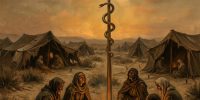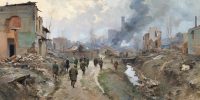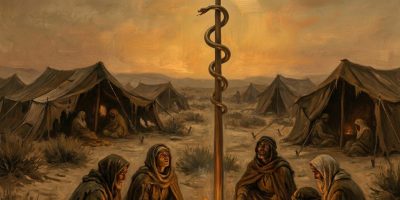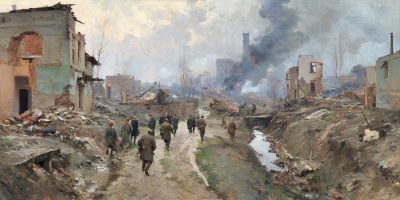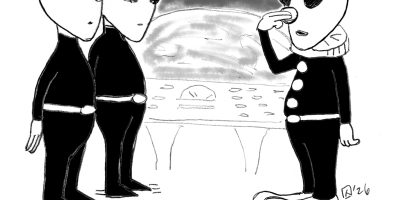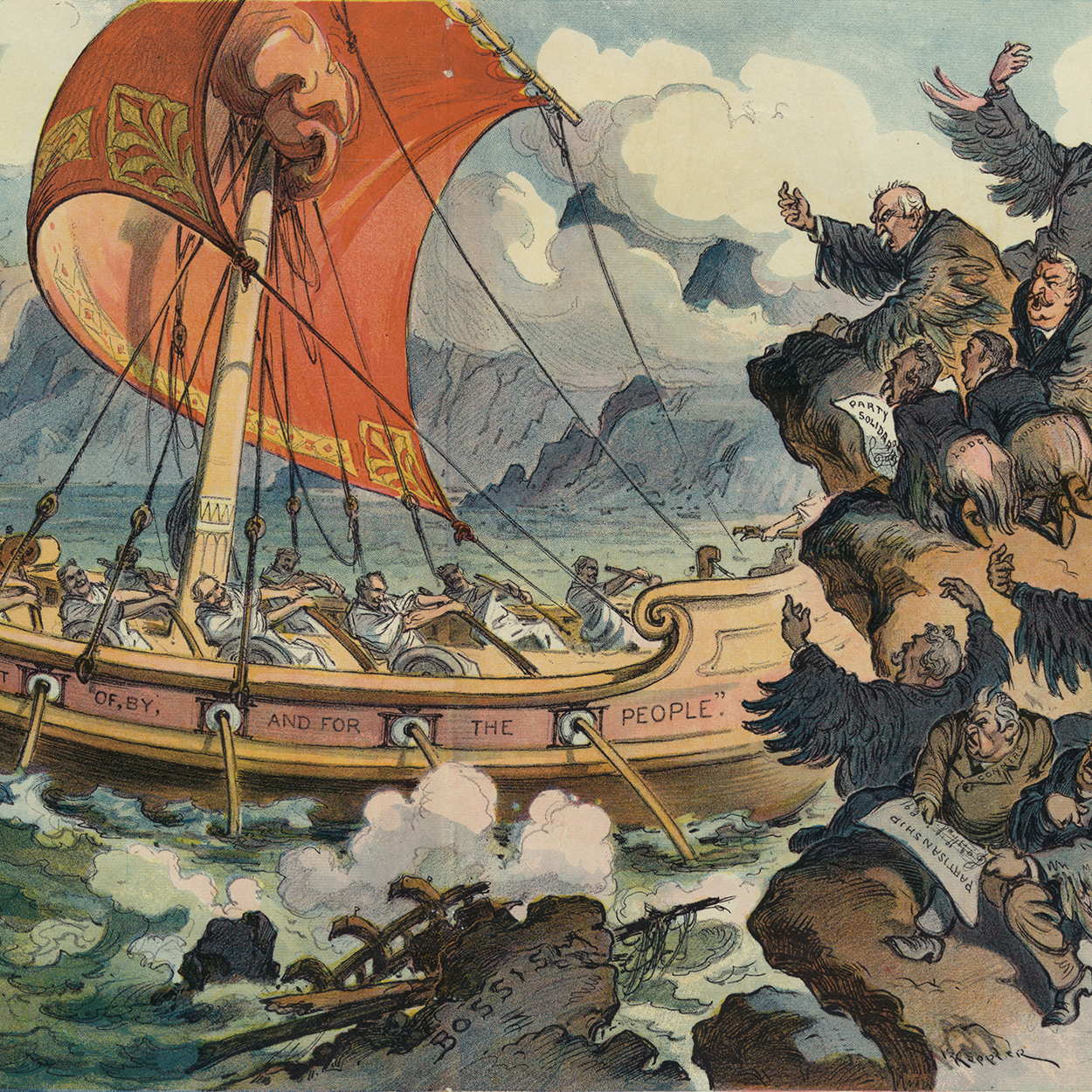This final chapter of Radiant Mormonism briefly seeks to integrate the various gospel principles that should guide us as Latter-day Saints in living the “abundant life.” It does so by summarizing prophetic teachings about how to live lives of dignity by serving the living globally, beginning with close friends and neighbors, but then spreading far beyond our nice little comfort zone with an expansive view. We can either hunker down and play it safe, focusing on our nuclear family and local neighborhood. Or we can feel the spirit of Zion that changes our perspective, reaching out to bless dozens of others, followed by hundreds, and perhaps thousands. It’s totally up to us.
I begin with the stirring words of President Gordon B. Hinckley, who said, “If we are to build that Zion of which the prophets have spoken and of which the Lord has given mighty promise, we must set aside our consuming selfishness. We must rise above our love for comfort and ease, and in the very process of effort and struggle, even in our extremity, we shall become better acquainted with our God” (Hinckley, 1991, p. 59).
A century earlier, the church’s radical and fiery leader John Taylor cried out against the greed and selfishness of the Utah pioneers, calling on them, even demanding that they provide economic support to create jobs for the many saints who were unemployed and hungry. “Talk about financiering! Financier for the poor, for the working man, who requires labor and is willing to do it, and act in the interest of the community for the welfare of Zion, and the building up of the kingdom of God upon the earth. This is your calling; it is not to build up yourselves, but to build up the Church and kingdom of God…. Do not let us have anybody crying for bread, or suffering, for want of employment. Let us furnish employment for all” (Taylor, 1878, p. 308).
Twentieth century LDS apostles and prophets have consistently admonished church members to move above and beyond their conspicuous consumption and materialism by actually seeking to practice principles of stewardship, consecration, and United Order values today. As President Lorenzo Snow articulated the matter, we are to dwell essentially as equals, “for the purpose of uniting the Latter-Day Saints, the people of God, and preparing them for exaltation in the celestial kingdom, and also for the purpose of preparing them here on this earth to live together as brethren…so that there shall be no poor found in the midst of the Latter-Day Saints, and no monied aristocracy in the midst of the people of God” (Snow, 1878, p. 342). We must rise above our love for comfort and ease.
As President Ezra Taft Benson put it, United Order values are critical to worthy LDS living: “We must not lose sight of the fact that all we are doing now is but a prelude to the establishment of the United Order, and living the law of consecration. The individual saints must understand this” (Benson, 1988, p. 123). Are we following his admonition?
Joseph Smith taught that we have the opportunity and responsibility “to feed the hungry, to clothe the naked, to provide for the widow, to dry up the tear of the orphan, to comfort the afflicted, whether in this church or any other, or in no church at all, wherever he finds them” (1842, p. 732). One of Joseph’s earliest apostles, John Taylor (1879), preached the doctrine of full employment for God’s children, declaring “that you require among yourselves; and also find employment for every man and woman and child within this Stake that wants to labor. That is what you should do” (p. 165).
Today in 2023, our challenges are every bit as great as in earlier years of church history, because we must unite God’s children, not merely spiritually or psychologically, but economically as well. Let us remember the counsel from President Joseph F. Smith (1905). He pointed out that the Prophet Joseph believed that “a religion which has not the power to save people temporally and make them prosperous and happy here, cannot be depended upon to save them spiritually, to exalt them in the life to come” (p. 242).
In raising and teaching our large family the full meaning of the gospel, my wife, Kaye, and I have sought to educate and—more importantly—practice the fullness of a “Zion lifestyle,” giving as much money as possible to the church and to the many good organizations seeking to assist those who suffer. We’ve been blessed with sufficient resources to manage on roughly half of our income so that we could donate the other half to those needing temporal support.
In doing this, we’ve drawn on several magnificent scriptural sources to guide our lifestyles. One is from Nephi’s record in the Book of Mormon after Jesus’s atoning sacrifice and resurrection when he appeared to the surviving, yet vanquished, Nephites. Readers will recall reading that he admonished the people to unite as a genuine Christian community. They did so, and it led to the transformational fact that they soon “had all things common among them; therefore there were not rich and poor, bond and free, but they were all free, and partakers of the heavenly gift” (4 Nephi, vs. 3). Over the next roughly 200 years there was equality and the prevalence of love, such that “surely there could not be a happier people among all the people who had been created by the hand of God” (4 Nephi, vs. 16).
Many excerpts from the Book of Mormon warn us about the problems of pride related to our obsession with material things. Today, in 2023, I worry not only about many Americans’ obsessions with fancy cars, their ever-ending acquisition of electronic toys, and their insatiable “need” to dine at the most expensive restaurants and travel to exotic resorts. I also worry about their fixation on designer brands of jewelry and clothing. “And it came to pass…that the people of the church began to wax proud, because of their exceeding riches, and their fine silks, and their fine-twined linen…and in all these things were they lifted up in the pride of their eyes, for they began to wear very costly apparel” (Alma 4:6).
A valuable religious story about living simply and observing the values of a more-righteous economics that has always guided decisions of righteous people comes from the scriptures detailing the works and words of the ancient prophet Enoch in the Pearl of Great Price. I’ve especially appreciated the insights about the City of Enoch from one of our most literate and scholarly apostles, Elder Neal Maxwell. He wrote a small, 64-page volume entitled Of One Heart: The Glory of the City of Enoch. In it, Apostle Maxwell writes of how that particular utopian society grew out of the righteous, Zion practices of God’s people over hundreds of years. But how were they able to practice consecration and stewardship during those turbulent times? Elder Maxwell (1979, pp. 37–39) points out that they had “learned not to withhold affection and esteem from each other” and this practice eventually led to their “no longer holding back” their goods. “Enoch tells us that it is not given that one man should possess that which is above another, wherefore the world lieth in sin.” Maxwell also articulates important gospel principles and cultural values of the followers of Enoch, including the fact that they achieved greater efficiency by laboring in love; they highly valued the work ethic; and they used cooperation rather than competition as their motivation. The ultimate result? “The Lord called his people ZION” (Moses 7:18).
How to achieve this is, of course, a major question. Apostle George Q. Cannon, counselor in the First Presidency of Brigham Young, is one of many leaders besides Jesus Himself to call on us to reduce human suffering. But even he admitted this is a complex issue. As he once pointed out, we must be up to the task because the Lord of Heaven himself had “chosen his people, the Latter-day Saints, to solve these knotty problems that have troubled the brains and afflicted the children of men for so many centuries” (Cannon, 1869, p. 99).
As one of the perhaps-radical early pioneers, Elder Cannon (1878) also voiced his concern that the LDS people would become too proud and greedy—which apparently has come true, when we observe Utah’s many wealthy mansions and expensive automobiles while the masses have no access to low cost-housing and must use public transportation for their often-menial jobs. We witness far too many poor families, children without medical care, and rejection of migrants fleeing crime and poverty south of the U.S. border. Likewise, Lorenzo Snow preached, “Now let things go on in our midst in our Gentile fashion, and you would see an aristocracy growing amongst us, whose language to the poor would be, ‘We do not require your company; we are going to have things very fine; we are quite busy now, please call some other time.’ You would have classes established here, some very poor and some very rich. Now, the Lord is not going to have anything of that kind. There has to be an equality; and we have to observe these principles that are designed to give everyone the privilege of gathering around him the comforts and conveniences of life” (Snow, 1878, p. 349). Service to others is my testimony.
Elder Cannon (1878) also decreed that a “man who has got the blessings of God around him, should be willing to sacrifice a portion of his surplus means to establish some industry, that this poor man can work and obtain a good remuneration for his labor, that he can see comfort and convenience before him, by persevering as he has done who has been thus blessed. This is the spirit and aim of the United Order, and that we should endeavor to establish. We should employ our surplus means in a manner that the poor can have employment and see before them a competence and the conveniences of life, so that they may not be dependent upon their neighbors” (p. 349).
We learn by carefully focusing on this principle stated in the revelations received in the church’s early days. For example: “If any man shall take of the abundance which I have made, and impart not his portion, according to the law of my gospel, unto the poor and the needy, he shall, with the wicked, lift up his eyes in hell, being in torment.” (Doctrine and Covenants 104:18). I’ve often inquired of some of my LDS friends and close neighbors about this verse. The occasional replies include such responses as these: “Well, I don’t read it exactly that way.” Or, “This is referring to the future when the millennium is on earth.” Or even “When the president of the church orders me to share what I have with the poor, I’ll do so. But not now.”
If our responsibility in becoming a “beloved community,” as the Rev. Martin Luther King, Jr., called for, or in building a Zion community, as LDS scriptures mandate, the question of our willingness to live simply so as to give our extra money and things to help the poor is quite problematic. At least this seems to be true, according to Brigham Young. Said he, when stressing the principle of consecration during a great 1855 sermon in the Salt Lake Tabernacle: “The brethren wished me to go among the churches, and find out what surplus property the people had…. Before I started, I asked Brother Joseph, ‘Who shall be the judge of what is surplus property?’ Said he, ‘Let them be the judges themselves…. I never [found] a man yet who had a dollar of surplus property. No matter how much one might have, he wanted all he had for himself, for his children, his grandchildren, and so forth…. Occasionally, some were disposed to do right with their surplus property; and once in a while you would find a man who had a cow which he considered surplus, but generally she was of a class that would kick a person’s hat off, or eyes out, or the wolves had eaten off her teats. You would once in a while find a man who had a horse that he considered surplus, but at the same time he had the ringbone, was broken-winded, spavined in both legs, and had the pole evil at one end of the neck and a fistula at the other, and both knees sprung” (Young, 1855, p. 307). Apparently, after the pioneers began emigrating to territorial Utah, in what was then called the early Great Basin Kingdom, they had the same love of material things and reluctance to hold onto every single possession as do many Latter-day Saints living comfortably today.
A dear friend of mine, Joe Christensen, raised this point in one General Conference. He had been the director of the Institute of Religion at the University of Utah when I was an undergraduate student there, and I had taken his inspiring class. Later he was named head of the Church Education System and was my supervisor when I founded the institute program in Ann Arbor at the University of Michigan. After serving as president of Brigham Young University–Idaho, he was appointed a General Authority Seventy. In General Conference he once offered good insights about the extent of our giving to disenfranchised, struggling families, including citing C. S. Lewis’s 1952 little volume Mere Christianity. Joe’s suggestion? “In addition to paying an honest tithing, we should be generous in assisting the poor. How much should we give? I appreciate the thought of C. S. Lewis on this subject. He said: ‘I am afraid the only safe rule is to give more than we can spare…. If our charities do not at all pinch or hamper us…they are too small. There ought to be things we should like to do and cannot do because our charitable expenditures excludes them’” (Christensen, 1999, p.4).
President Spencer W. Kimball (1977) saw the folly of our latter-day possessiveness and greed that apparently block the powers of heaven from radiating down on us. He reminded us that “Pres. Joseph F. Smith said: ‘You must continue to bear in mind that the temporal and the spiritual are blended. They are not separate. One cannot be carried on without the other, so long as we are here in mortality.’ The highest achievement of spirituality comes as we conquer the flesh. We build character as we encourage people to care for their own needs. As givers gain control of their desires and properly see others needs in light of their own wants, then the powers of the gospel are released in their lives. They learn that by living the great law of consecration, they ensure temporal salvation and spiritual sanctification. Isn’t the plan beautiful? Don’t you thrill to this part of the gospel that causes Zion to put on her beautiful garments? When viewed in this light, [this is] the essence of the gospel. It is the gospel in action. It is the crowning principle of a Christian life” (1977, pp. 76–79).
President Kimball’s counsel is akin to the prophetic words of the Book of Mormon prophet Jacob, who clearly informs us regarding how riches can be acquired and the things for which they should be used: “But before ye seek for riches, seek ye for the kingdom of God. And after ye have obtained a hope in Christ ye shall obtain riches, if ye seek them…for the intent to do good—to clothe the naked, and to feed the hungry, and to liberate the captive, and administer relief to the sick and the afflicted” (Jacob 2:18–19). I don’t read into these words anything about building my personal empire, or acquiring an expensive new car every year—not even a Tesla for a discounted cost of “only” $92,000. I have many friends who spend much of their time seeking new jobs, better compensation, and new career adventures in large corporations. They acquire multi-million-dollar homes every 12 to 18 months, owning one, two, or three simultaneously. An acquaintance of mine in Salt Lake City finally decided to sell his $47 million home because his two daughters were going off to college and he said he didn’t need such a “large” house anymore.
As one of my mentors, the great LDS humanitarian Lowell Bennion, told me about such things: “I’m not judging. But I do question some people’s point of view” (Bennion, 1982). I learned much from him since I was a young University of Utah college student, enjoying our wonderful conversations. Over the years, Lowell wrote a slew of official church manuals, integrating the LDS faith with writings of the world’s great philosophers and some of their theories. He advised top LDS Church leaders through the decades. He helped develop the Church Education System (CES), including being greatly honored by President Gordon B. Hinckley, the main speaker at Lowell’s funeral. I have tried to follow his motto since we were both Institute of Religion directors who collaborated with LDS students in teaching the gospel for many years. In fact, the Brethren called him to establish the very first University of Utah Institute program. After he finally left that position on campus, he became a professor, as I did also. But on doing so, and forever after, he would say: “I used to teach religion; now I practice it.”
As I remember “Brother B,” as he was affectionately called by many students at the University of Utah, including some who became General Authorities, even apostles, one of his published insights comes to mind. In a small, simple 1996 volume, he raised the specter of what ancient prophets from Old Testament times might decree today in challenging our modern LDS comfortableness with practicing our religion on special days with designated ordinances, yet overlooking the very essence of true religion. “Much of the Old Testament ritual rejected by the prophets, such as burnt offerings, has little meaning for us today. To sense the full impact of these prophetic teachings, we need to use present rituals. Wouldn’t we be shocked if a prophet today speaking for God should say to the Saints: ‘I hate your baptisms and sacrament service. I will not hear your prayers and songs any more. Amen to your priesthood. Be honest in your dealings, be merciful to the poor and afflicted, be understanding to the needs of others. Then my spirit will be with you and you will be with me’” (Bennion, 1996, p. 32). “Brother B’s” philosophy centered on charity and compassion—not status, authority, and ritual. To me this suggests that we are to find our deepest religious experiences in feeding the hungry and aiding impoverished widows. Such a view parallels my own. He worried about our materialism as LDS members, including our emphasis on luxury, which he explains “by its very definition means going beyond need. I also see a strong motivation of self-indulgence and vanity” (Bennion, 1988, p. 44).
I truly hope that my friends and co-laborers who seek to build a better world have enjoyed and will profit from a few ideas and experiences detailed in Radiant Mormonism by those of us who have launched new social ventures to reduce human suffering and empower the poor. Some years ago, I was asked to write a brief testimony about my faith on an LDS website, “Mormon Scholars Testify,” a project that several members of the LDS religion faculty at Brigham Young University established for FAIR Mormon, a research organization. I add it today in bearing witness to the church and the entire world:
“The highest level of Mormonism is that of Stewardship and Consecration, meaning we are called to practice what we preach. While some Mormons feel that such practices are reserved for some future date when the Church announces we should begin building consecrated lives, many of us understand on deeper levels that the time to do so is here and now. The bulk of my adult and family life has centered on offering all I have to God and His children. Related principles are equality, simplicity, sacrifice, pure motives, cooperation, and other United Order values which inspire us to serve the poor and needy. As saints of the latter days we are told to give of our time, money, and skills to building Zion, a condition in which there is no poverty, no tears, no sorrow…. My testimony is a matter of practice, a way of living. My life is my witness. Service to others is my testimony. In conclusion, let me affirm my commitment to the practices of the LDS Church. It is an article of my faith that I believe in being honest, true, chaste, benevolent, virtuous, and in doing good to all. I believe all things, I hope all things, I have endured many things, and hope to be able to endure all things. If there is anything virtuous, lovely, or of good report or praiseworthy, I seek after these things” (Woodworth, 2010). We can build our utopia here on earth.
I have looked upon the community of the Latter-day Saints in vision and beheld them organized as one great family of heaven, each person performing his several duties in his line of industry, working for the good of the whole more than for individual aggrandizement; and in this I have beheld the most beautiful order that the mind of man can contemplate, and the grandest results for the building up of the kingdom of God and the spread of righteousness upon the earth. Will this people ever come to this order of things? Are they now prepared to live according to that patriarchal order that will be organized among the true and faithful before God receives His own? We all concede the point that when this mortality falls off; and with it its cares, anxieties, love of self, love of wealth, and love of power, and all the conflicting interests which pertain to this flesh, that then, when our spirits have returned to God who gave them, we will be subject to every requirement that he may make of us, that we shall then live together as one great family; our interest will be a general, a common interest. Why can we not so live in this world?
References
Alma 4:6.
Bennion, L. L. (1982). Personal conversation with the author.
Bennion, L. L. (1988). Do Justly and Love Mercy: Moral Issues for Mormons. Cannon Press.
Bennion, L. L. (1996). How Can I Help: Final Selections by the Legendary Writer, Teacher, and Humanitarian. Aspen Books.
Benson, E. T. (1988). Teachings of Ezra Taft Benson. Bookcraft.
Cannon, G. Q. (1869). Journal of Discourses, vol. 13.
Cannon, G. Q. (1878). Journal of Discourses, vol. 19.
Christensen, J. J. (1999). “Greed, Selfishness, and Overindulgence.” General Conference, April.
Doctrine and Covenants 104:18.
Hinckley, G. B. (1991). “Our Mission of Saving.” Ensign, November.
Jacob 2:18–19.
Kimball, S. W. (1977). Ensign, November.
Maxwell, N. A. (1979). Of One Heart: The Glory of the City of Enoch. Deseret Book. (See pp. 20, 37–39, 49.)
Moses 7:18. The Pearl of Great Price.
4 Nephi: 3 and 16.
Smith, J. (1842). Times and Seasons, March 15.
Smith, J. (1977). Teachings of the Prophet Joseph Smith. Joseph Fielding Smith (ed.). Deseret Book.
Smith, J. F. (1905). “The Truth About Mormonism,” Out West, vol. 23.
Snow, L. (1878). Journal of Discourses, vol. 19. https://jod.mrm.org/19/341.
Taylor, J. (1878). Journal of Discourses. vol. 19, Discourse 43. Also published in the Latter-day Saint Millennial Star. April 8.
Taylor, J. (1875). Journal of Discourses, vol. 20.
Widtsoe, J. A. (1943). Evidences and Reconciliations. Bookcraft. Also in Improvement Era, vol. 43.
Woodworth, W. (2010). Mormon Scholars Testify. FAIR Mormon website.
Young, B. (1855). Journal of Discourses, vol. 2.
Young, B. (1868). Journal of Discourses, vol. 12.


